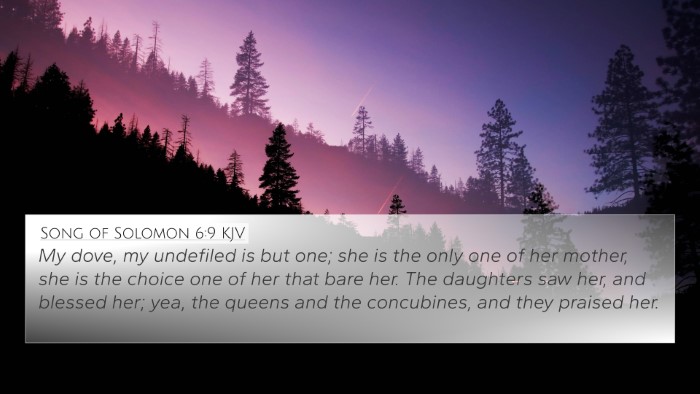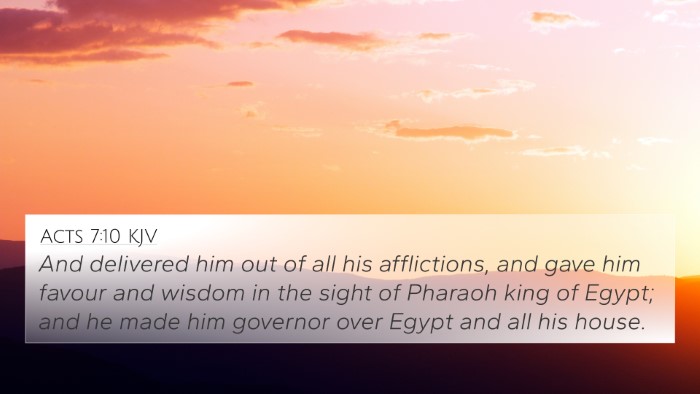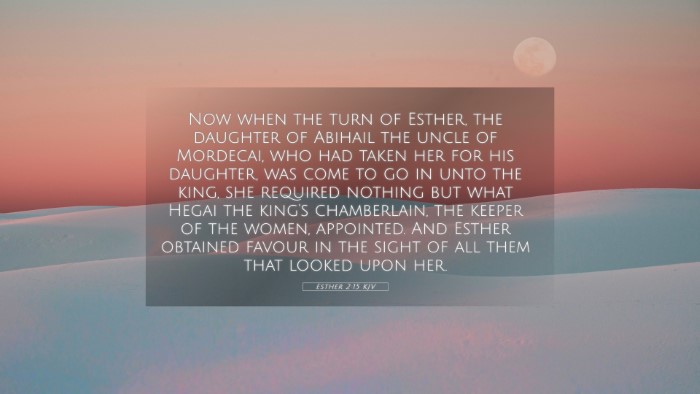Old Testament
Genesis Exodus Leviticus Numbers Deuteronomy Joshua Judges Ruth 1 Samuel 2 Samuel 1 Kings 2 Kings 1 Chronicles 2 Chronicles Ezra Nehemiah Esther Job Psalms Proverbs Ecclesiastes Song of Solomon Isaiah Jeremiah Lamentations Ezekiel Daniel Hosea Joel Amos Obadiah Jonah Micah Nahum Habakkuk Zephaniah Haggai Zechariah MalachiEsther 2:15 Similar Verses
Esther 2:15 Cross References
Now when the turn of Esther, the daughter of Abihail the uncle of Mordecai, who had taken her for his daughter, was come to go in unto the king, she required nothing but what Hegai the king's chamberlain, the keeper of the women, appointed. And Esther obtained favour in the sight of all them that looked upon her.
Uncover the Rich Themes and Topics of This Bible Verse
Listed below are the Bible themes associated with Esther 2:15. We invite you to explore each theme to gain deeper insights into the Scriptures.
Esther 2:15 Cross Reference Verses
This section features a detailed cross-reference designed to enrich your understanding of the Scriptures. Below, you will find carefully selected verses that echo the themes and teachings related to Esther 2:15 KJV. Click on any image to explore detailed analyses of related Bible verses and uncover deeper theological insights.

Esther 2:3 (KJV) »
And let the king appoint officers in all the provinces of his kingdom, that they may gather together all the fair young virgins unto Shushan the palace, to the house of the women, unto the custody of Hege the king's chamberlain, keeper of the women; and let their things for purification be given them:

Song of Solomon 6:9 (KJV) »
My dove, my undefiled is but one; she is the only one of her mother, she is the choice one of her that bare her. The daughters saw her, and blessed her; yea, the queens and the concubines, and they praised her.

Esther 9:29 (KJV) »
Then Esther the queen, the daughter of Abihail, and Mordecai the Jew, wrote with all authority, to confirm this second letter of Purim.

Acts 7:10 (KJV) »
And delivered him out of all his afflictions, and gave him favour and wisdom in the sight of Pharaoh king of Egypt; and he made him governor over Egypt and all his house.

Esther 2:7 (KJV) »
And he brought up Hadassah, that is, Esther, his uncle's daughter: for she had neither father nor mother, and the maid was fair and beautiful; whom Mordecai, when her father and mother were dead, took for his own daughter.

Song of Solomon 8:10 (KJV) »
I am a wall, and my breasts like towers: then was I in his eyes as one that found favour.
Esther 2:15 Verse Analysis and Similar Verses
Understanding Esther 2:15
Esther 2:15 reads: "When the turn came for Esther, the young woman Mordecai had adopted, the daughter of Abihail the uncle of Mordecai, to go to the king, she asked for nothing other than what Hegai, the king’s eunuch who was in charge of the harem, suggested. And Esther won the favor of everyone who saw her."
Overview and Context
Esther 2:15 is a pivotal verse within the Book of Esther, detailing Esther's preparation to approach King Ahasuerus. This passage highlights her unique status as both a Jewish woman and a member of the royal harem. The setting is significant, as Esther’s eventual rise to influence stems from her initial submission and grace in the eyes of others, particularly Hegai, the king's eunuch.
Commentary Insights
-
Matthew Henry's Commentary:
Matthew Henry emphasizes Esther's humility and reliance on Hegai's counsel. He notes that Esther's choice to ask nothing beyond Hegai's advice demonstrates her wisdom and willingness to submit to the preparations that may lead her to full acceptance before the king. Her success is attributed to God's providence, suggesting that our choices, when guided by divine wisdom, often lead to favor.
-
Albert Barnes' Notes:
Albert Barnes underscores the significance of Esther's beauty and her behavior. He remarks that her appeal to the king was not based on external adornment but on her virtuous character and inner beauty. This perspective highlights that true favor often gleaned from one's character rather than mere appearances. His analysis implies a larger narrative of God's plan in using the meek to bring about great change.
-
Adam Clarke's Commentary:
Adam Clarke aligns his thoughts with the historical context, asserting that Esther’s situation reflects the liberation and rising prominence of the Jewish people. He also alludes to God’s hand in directing events to secure a place for Esther at the royal court, further satisfying the divine providence theme prevalent throughout the scriptures.
Key Themes and Interpretations
The examination of Esther 2:15 reveals several key themes that resonate throughout the Bible:
- Divine Providence: Esther’s journey reflects the hidden hand of God working in seemingly mundane decisions. Her success results from both her actions and God's overarching plan.
- Modesty and Submission: The modesty of Esther in not demanding ostentation aligns with biblical teachings on humility, suggesting a broader lesson in spiritual character.
- Influence of Counsel: The verse serves as a reminder that sound counsel, as exemplified by Hegai, can guide individuals toward favorable outcomes.
Bible Cross-References
Esther 2:15 connects to numerous other scriptures, enhancing our understanding through inter-Biblical dialogue:
- Proverbs 3:5-6: "Trust in the LORD with all your heart and lean not on your own understanding..." - Reflects Esther's submission to wise counsel.
- 1 Peter 3:3-4: "Your beauty should not come from outward adornment, such as elaborate hairstyles and the wearing of gold jewelry or fine clothes..." - Compliments Esther’s internal beauty as noted by Barnes.
- Hebrews 11:32-34: Mentions Esther (though indirectly) as a woman of faith among significant figures of the Old Testament.
- Exodus 2:5: References another woman, Pharaoh's daughter, who played a significant role in the survival and destiny of the Hebrew people.
- Esther 4:14: "And who knows but that you have come to your royal position for such a time as this?" - Emphasizes Esther’s situation as part of God’s larger plan.
- Romans 8:28: "And we know that in all things God works for the good of those who love him..." - Echoes the theme of divine providence seen in Esther's story.
- Psalms 75:6-7: "No one from the east or the west or from the desert can exalt themselves. It is God who judges..." - Illustrates God’s sovereignty over earthly affairs, as demonstrated in Esther's life.
Thematic Connections with Other Scriptures
There is a rich tapestry of connections that interlink Esther 2:15 with other passages:
- Humility in Service: Esther’s humility resonates with Matthew 5:5, where it states, "Blessed are the meek, for they will inherit the earth."
- God's Plan Revealed: Esther's story is echoed in the actions of Daniel (Daniel 2:21), where God changes times and seasons and gives wisdom to the wise.
- Women's Influence: The influence of women in biblical narratives is a theme that is continued in Luke 8:3, showcasing their roles in supporting Jesus' ministry.
- Faith Under Pressure: Similar to Esther’s faith journey, consider Philippians 4:6-7, where the faithful are encouraged not to be anxious.
Tools for Bible Cross-Referencing
Utilizing tools for Bible cross-referencing can enhance one's understanding of scripture. Some recommended resources include:
- Bible Concordance: Provides references to key terms and concepts found throughout the Bible.
- Bible Cross-Reference Guide: A valuable tool for connecting themes and verses across scripture.
- Comprehensive Bible Cross-Reference Materials: Books and digital apps that compile verse connections based on themes.
Conclusion
Esther 2:15 serves as a foundational verse to understand the themes of divine providence, humility, and the importance of wise counsel in the scriptures. By employing cross-referencing methods, readers can deepen their understanding of how this verse interplays with broader biblical narratives, drawing connections that illuminate the cohesive message of God's faithful guidance throughout history.


